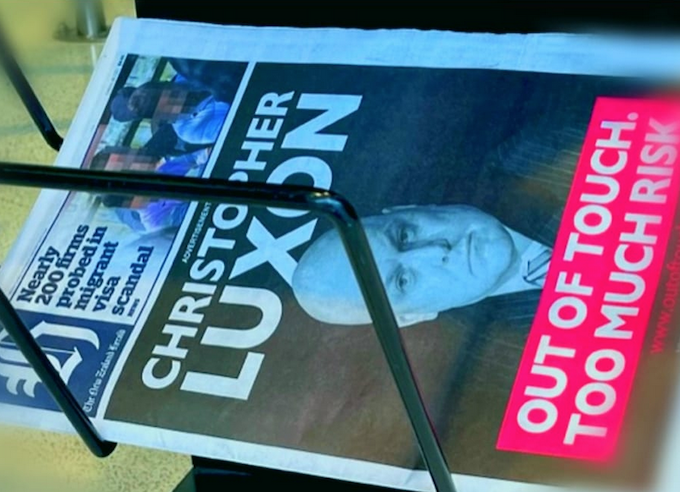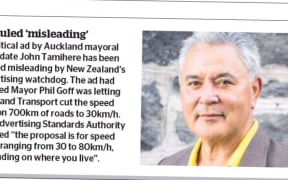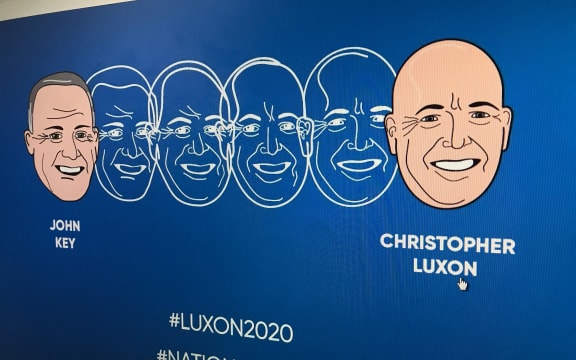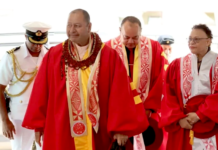
RNZ MEDIAWATCH: By Colin Peacock, Mediawatch presenter
The New Zealand Herald copped criticism for publishing a front-page attack ad targeting the National Party leader this week — but it was far from the first time ads like it have appeared in print.
Meanwhile, questions were asked about other coverage that looked like it might be taking sides as the official Aotearoa New Zealand election campaign period begins.
“You’ve got to survive in the media. You got to take the ads,” Newstalk ZB morning host Kerre Woodham told listeners last Monday, explaining the the controversial Council of Trade Union ad labelling the National Party leader Christopher Luxon “out of touch and too risky”.
“You’ve got to survive in the media. You got to take the ads,” Newstalk ZB morning host Kerre Woodham told listeners last Monday, explaining the the controversial Council of Trade Union ad labelling the National Party leader “out of touch and too risky”.
It was clearly an election advocacy ad — and it was identified as such in the Herald. But as soon as the ad came through the NZME ad department, the senior editors there must have known devoting the front page to it would become a news story.
The afternoon host at the Herald’s NZME stablemate NewstalkZB, Andrew Dickens, certainly thought so.
“I think this is news. This is why I’m talking about it on the radio. I’m not involved with this decision. . . but I think they need to write about it and say how they actually determine who gets the ‘wraparound’,” he told his listeners.
Blue sticker ads
The Herald top brass wasn’t keen on that, but election ads on the front page aren’t entirely unprecedented.
A former Herald editor, Tim Murphy, pointed out the Weekend Herald has allowed the National Party to add detachable blue stickers late in previous campaigns.
And once papers opened the door to wraparound front-and-back page ads for retailers (who paid a pretty penny for them during the covid-19 crisis), it was only a matter of time before someone selling political messages rather than fridges took up the space as well.
The CTU ad was within the rules for political promotion by third parties. As long as they registered, they can spend the thick end of $400,000 on ads doing down political opponents if they want to.
Gordon Campbell on scoop.co.nz said that apart from the front-page spot, there was nothing really novel about an ad criticising a party leader who was actively campaigning as the embodiment of his party’s policies.
And while the CTU’s campaign also appeared on billboards and social media platforms the same day, it was its appearance on the front page of a paper obliged to cover the campaign fairly which raised eyebrows.
“This will probably backfire on the Herald,” Andrew Dicken told his listeners, at the same moment one texted in to say he had cancelled his subscription to the Herald because of it.
‘False’ ads not acceptable
Andrew Dickens told his listeners NZME radio stations had rules too — and could not accept ads that are “false, wrong, or lies or defamatory.”
Newstalk ZB found that out back in 2019, when it ran a political ad in which Auckland mayoral candidate John Tamihere said no suburb would escape Auckland Transport’s “crazy plan” to cut the speed limits on Auckland roads.
The Advertising Standards Authority said that claim was false and the campaign ad, which had run for two weeks, should be dropped.

NZME told the Authority it had presumed the client’s script and figures provided were correct.
“Our team has been reminded to be vigilant when accepting advocacy advertisements to avoid this from reoccurring,” NZME said.
In other words, they promised to do fact checks before cashing cheques from people peddling political propaganda at election time.
But at that time, the Weekend Herald had just published another controversial political ad all about Christopher Luxon.
The half page ad showed former Prime Minister John Key morphing into Christopher Luxon in the style of Dick Frizzell’s famous “From Mickey to tiki” illustration.
Luxon was not even a member of the National Party at that point, let alone a candidate, but the client for that ad turned out to be property tycoon Steven Brooks, who really wanted Luxon to be the next party leader.
His involvement should have been declared on the ad, which had the appearance of unauthorised party political advertising.
Ads they didn’t want

While that’s all history now, Newstalk ZB listeners on Monday were also phoning concerns about ads that the Herald wouldn’t print in the recent past.
They were part of a campaign from the lobby group Family First, which our three biggest newspaper publishers all declined to run.
Family First leader Bob McCoskrie has accused them of colluding to cancel the ad, which had the slogan: “What is a woman?” and the website address for a campaign declaring it was “time to push back” against gender self-identification.
MoCoskrie said the ad departments of each publisher initially accepted the ad but editors subsequently decided they weren’t fit to print.
But while the paper publishers exercised their right not to print the ads, they did go up on billboards in public.
Last month the Advertising Standards Authority complaints board upheld a complaint about them, ruling the ad was “misleading and not socially responsible,” but only because the identity of the advertiser — Family First — wasn’t sufficiently clear for an advocacy ad.
From today, September 10, until the day before the election we are in the official election period overseen by the Electoral Commission.
During this time special rules and a separate dedicated code of broadcasting practice apply to what are known as “election programmes”, defined as radio or TV advertisements by or for a party or candidate which encouraged voters to vote in particular ways or for particular parties or people.
Broadcasters and publishers will be paying extra attention to balance and fairness now, with the watchdogs running a fast-track process for complaints about seriously misleading claims and serious allegations.
This article is republished under a community partnership agreement with RNZ.














































